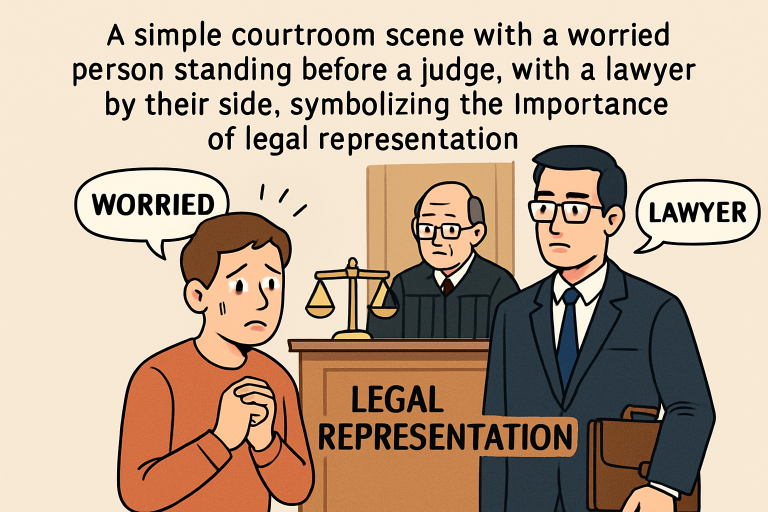Key Takeaways
- The right to legal representation is guaranteed by the U.S. Constitution and is fundamental to a fair trial.
- Self-representation in criminal cases exposes individuals to significant risks due to complex legal procedures.
- Having an attorney can protect you from self-incrimination, ensure access to vital resources, and help secure fair sentencing.
- Experienced legal counsel provides crucial support both strategically and emotionally throughout criminal proceedings.
Table of Contents
- Understanding the Right to Legal Representation
- The Risks of Self-Representation
- Complexity of Legal Procedures
- Negotiating Plea Bargains
- Protection Against Self-Incrimination
- Access to Resources and Expert Witnesses
- Emotional and Strategic Support
- Ensuring Fair Sentencing
- Conclusion
Understanding the Right to Legal Representation
The Sixth Amendment to the U.S. Constitution guarantees that all individuals accused of crimes are entitled to legal counsel. This fundamental guarantee ensures that those facing prosecution have a fair chance to defend themselves, regardless of their financial means. The doctrine was famously upheld in Gideon v. Wainwright, which requires states to provide attorneys to defendants who cannot afford one. Without this safeguard, many would be forced to navigate an exceptionally complex legal system on their own.
Engaging a professional attorney early can make a critical difference in the outcome of a criminal case. Criminal charges threaten your freedom, reputation, and future, and the stakes are simply too high to risk going it alone. If you need experienced legal help, the team at Martinlawfirmpc is available to provide dedicated representation when it matters most.
The Risks of Self-Representation
Choosing to represent oneself(known as “pro se” representation) may seem empowering, but it almost always puts the defendant at a disadvantage. The court holds self-represented individuals to the same standards as trained lawyers. This means you must follow strict courtroom procedures, understand complex statutes, and apply rules of evidence and protocol, often against prosecutors with extensive experience. Mistakes, such as failing to object to improper evidence or misunderstanding procedural deadlines, can severely impact the defense and lead to unwanted convictions or harsher penalties.
Complexity of Legal Procedures
From arraignments to pre-trial hearings and the actual trial, criminal cases involve a labyrinth of steps. Each stage requires careful navigation, specialized legal filings, and adherence to stringent deadlines. Defense attorneys are skilled at navigating these procedural complexities, ensuring that your rights are asserted and mistakes are avoided at every phase, especially if the prosecution presents new or unexpected evidence.
Negotiating Plea Bargains
Plea bargains are common in the U.S. criminal justice system and can be advantageous under the right circumstances. However, understanding the long-term impacts of accepting a plea—such as effects on your criminal record, employment opportunities, and immigration status—requires deep legal insight. Attorneys review the prosecution’s case, explain your options clearly, and negotiate for outcomes that protect your best interests, something that is nearly impossible to achieve effectively on your own.
Resource:

Protection Against Self-Incrimination
When confronted by police or prosecutors, saying the wrong thing can have devastating consequences. Even innocent remarks may be used by the prosecution to build a case against you. An experienced attorney shields you from inadvertently incriminating yourself by ensuring you understand your right to remain silent and by handling communications with law enforcement. This protection is critical from the earliest stages of an investigation, helping you avoid pitfalls that can occur during police interviews or formal testimony.
Access to Resources and Expert Witnesses
Building a strong defense is about much more than simply disputing facts; it often requires a variety of resources. Criminal defense lawyers work with private investigators, forensic analysts, and expert witnesses to strengthen your case. These professionals can uncover exonerating evidence or challenge prosecution arguments with specialized expertise that self-represented defendants lack. Their insights are often pivotal in raising reasonable doubt and achieving a positive outcome.
Emotional and Strategic Support
Facing criminal charges is an emotionally draining experience. Anxiety, fear, and embarrassment can cloud judgment and lead to rash decisions. An attorney is not only your legal advocate but also a critical source of guidance and support. By providing rational, informed advice, lawyers help you remain calm, clearly understand your options, and avoid decisions based on stress or panic. They devise strategic defenses tailored to the unique facts of your case, preparing you for every possible development at court.
Ensuring Fair Sentencing
If a conviction cannot be avoided, proper legal counsel can still make a profound difference in the sentencing phase. Attorneys present mitigating factors, evidence of rehabilitation, and argue for alternatives to incarceration—such as probation, treatment programs, or community service. Their advocacy serves to minimize the impact of a conviction on your life and future. Without such representation, defendants risk facing the harshest possible punishment, often out of proportion to the facts of their case.
Conclusion
Navigating the criminal justice system without a qualified attorney exposes defendants to severe legal vulnerabilities. The stakes—ranging from loss of freedom to lifelong consequences—demand the skilled guidance of a legal professional at every step. By ensuring your rights are protected, your voice is effectively heard, and every possible defense is considered, an attorney is indispensable when facing criminal charges. Securing experienced legal counsel is not just a constitutional right—it may be the decisive factor in safeguarding your future.